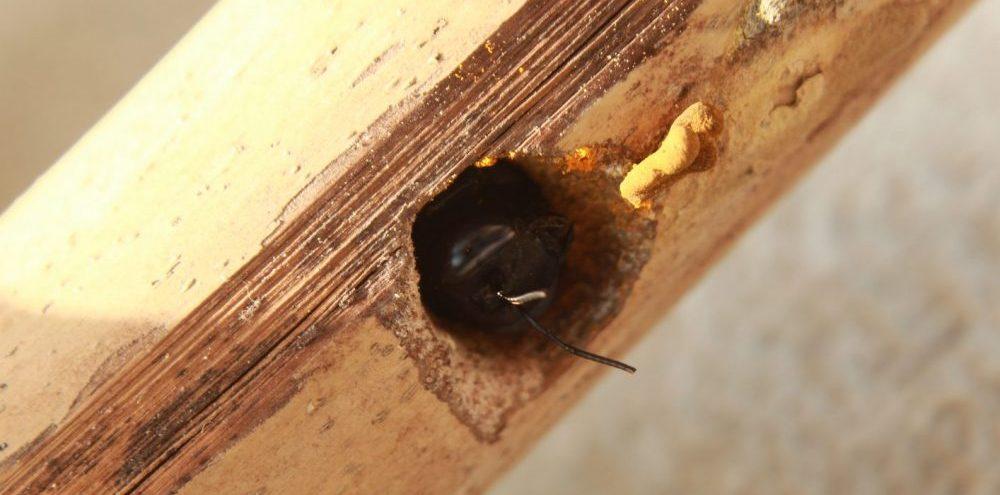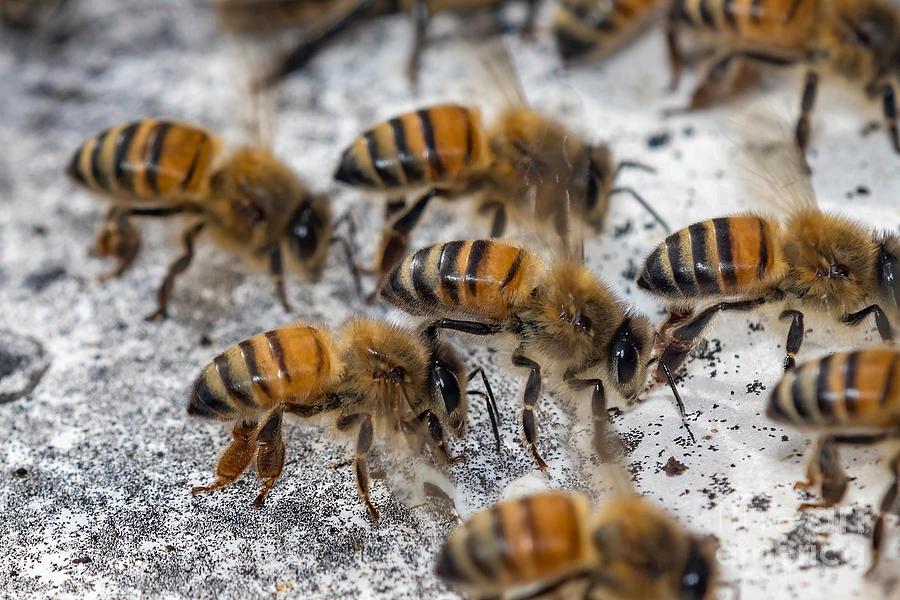
12 minute read
ARE PESTICIDES GOOD OR BAD? (CYRINE 6B
Are Pesticides Good Or Bad? (Cyrine 6B)
I’m sure that you were as upset as me to hear about how Natalie’s cat was poisoned by toxic agricultural chemicals and Cyrine’s article goes into more detail about which products are now banned in certain countries because they are so toxic.
Advertisement
Have you ever thought that your food looks perfect? Just like it is made from plastic? Have you ever wondered why all the apples sold in the supermarket look exactly the same? Have you ever wondered why organic food is almost twice the price of non-organic food? Have you bothered to even find out? Well if you haven’t bothered, I have! So if you want to find out more about this topic, keep on reading because your food isn’t exactly what it appears to be.
What are pesticides? What are the worst pesticides and why?
Pesticides are a type of poison farmers use to get rid of unwanted plants or animals/insects to grow their crops. For example, some farmers use pesticides to get rid of weeds that damage their crops. Although pesticides seem like a good thing, research has proven that they aren’t all that good. Scientists say that by using pesticides, we are ruining the habitats of animals and poisoning our own food. Direct contact with pesticides can cause serious injuries depending on the person’s health. Some of the following
happens when in direct contact with pesticides: it irritates the nose, throat, and skin causing burning, stinging, nausea, dizziness, and diarrhea, and itching as well as rashes and blisters depending on the strength of the pesticides.
Do all farmers use pesticides? If pesticides are bad, then why do people use them? The truth is, modern farmers use pesticides to grow only one crop in particular. They do this because it allows them to make more money because most people do not want to eat fruit and vegetables that look deformed or in other words “ugly” (to learn more about ugly fruits, check out Zahira Peters’s article). The good news is that some people have taken into account that pesticides are bad for your health, so farmers like Pappy Michel use natural pesticides that do not harm the environment or the people consuming the food he grows. For example, Pappy Michel uses ladybugs instead of pesticides to get rid of plant-eating insects such as “aphids”.
Do people know that pesticides are bad for their health? If they knew, would they start eating organic food? What is organic food? Organic food is food that is grown without using pesticides or any unnatural products. To find out whether people actually knew that pesticides were bad for their health, I sent out a survey to grade 6A, 6B, and 6C and asked them the following questions:
Do you eat more food grown with pesticides or do you eat more organic food?
Would you like to make an effort to ban pesticides?
If you eat more food grown with pesticides, would you like to start eating organic food?
If you eat food grown with pesticides, do you mind eating the chemicals? If so, why?
Did you know that food grown with pesticides is poisonous to your health?
Fourteen participants answered the survey. The data shows that 42.9% of participants eat more food grown with pesticides whereas 57.1% of participants eat food grown without pesticides. This shows that people do realize what they are eating, but do not want to make a difference. This is why I am trying to spread awareness about this issue because it can affect your health and become fatal if not treated.
For the third question, 64.3% of people who answered my form said that they would definitely want to make an effort to ban pesticides completely. The other 35.7% of people who answered my form said that might or might not want to help me ban pesticides for good.
For the fourth question, 71.4% of people who answered my form said that they definitely would want to start eating organic food if they were/are eating un organic food. The other 28.6% said that they maybe will stop eating food grown with pesticides, but it is not a complete yes. For the fifth question, everyone that answered my form except three people said that they do mind that they are consuming chemicals. One of the three other people said that they also mind that they are eating food grown with pesticides, but they can not find organic food. This is also an issue because there is more food grown with pesticides
than organic food which shows that not everybody is aware of this issue. The second person of the three said they didn’t know. The third person of the three said that their parents think that inorganic foods are fine, which they are not for various reasons which were explained in the previous paragraphs.
For the fifth and final question, 64.3% of the people who answered my form said that they knew about pesticides and why they are bad before they answered my survey, 21.4% said that they didn’t know until they read my survey, and the remaining 14.3% said that they had other ways of knowing.
What are the worst pesticides? Were there any health issues? There was indeed an outbreak in Europe with the pesticides called Glyphosate, also known as ‘Round-Up’. Glyphosate is a herbicide used to regulate plant growth and ripen specific crops. It is also used to kill annual and perennial grasses, broadleaf weeds, trees, and shrubs. The USA started using this pesticide in 1974. This herbicide has restrictions in the following countries:
Malawi
Thailand
Vietnam
Sri Lanka
Oman
Kuwait
United Arab Emirates
Bahrain Qatar Saudi Arabia St. Vincent and the Grenadines Bermuda Austria Belgium Czech Republic Denmark France Italy The Netherlands
There are always two sides to the story, even if one side is bad and the other side is good. The message I am trying to give you is that pesticides are designed to make farming easier, but it is not always healthier. Some pesticides do not have as big effects as others do. If you do eat more food grown with pesticides, I hope that you learned something after reading this article.
Citations
Website: https://www.dohanews.co/qatars-certified-organic-farmgears-expansion/
https://www.iloveqatar.net/guide/living/organicvegetable-farms-and-markets-in-qatar
https://foodinsight.org/what-happens-when-you-stopusing-crop-protection/
#:~:text=Without%20it%2C%20our%20crops%20are,and%2 0are%20destroyed%20by%20pests.&text=Without%20crop %20protection%2C%20green%20bean,can%20dramatically %20shrink%20cocoa%20yields.
https://www.pesticidereform.org/pesticides-humanhealth/ https://qz.com/1524049/monsanto-is-at-the-center-of-aplagiarism-scandal-rocking-the-eu/ #:~:text=A%20plagiarism%20scandal%20rocking%20the%2 0EU%20centers,safety%20of%20the%20weedkiller%20gly phosate&text=In%202017%2C%20the%20European%20Uni on,to%20cause%20cancer%20in%20humans. http://npic.orst.edu/factsheets/ glyphogen.html#:~:text=Glyphosate%20is%20an%20herbici de.,in%20the%20U.S.%20in%201974. https://www.canr.msu.edu/news/ killing_weeds_in_the_garden_with_glyphosate#:~:text=Round up%20or%20glyphosate%2C%20which%20is,broadleaf%20 weeds%2C%20trees%20and%20shrubs.
Images:
https://www.therange.co.uk/garden/pest-control-andweed-killer/weed-killer/roundup-concentrate-weedkiller#301407
Survey: https://docs.google.com/forms/d/1Fp7hSQxV3KeIxN3LWLW2ZsbqKZ0tPEsxCvJI0S5US8/ edit#responses
The High Price of Ugly Produce (Zahira 6B)
If you were starving to death would you eat an apple that is shaped wonky or bruised? So much produce is wasted and most of it is ugly , meaning that the produce is shaped odd or the produce is bruised.
Did you know that a third of the food farmers grow goes to waste and the main reason is because it is ugly?
Some people do not buy fruits and vegetables that look ugly because some people think the food is bad, but the produce that looks perfect is way more dangerous to eat because it is full of chemicals. The people who grow the food wear hazmat suits when they spread these chemicals on these fruits and vegetables and we are putting these chemicals into our mouth and eating them.
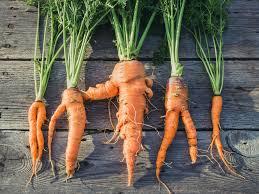
How much Ugly Produce is Wasted?
The negative attitude towards wonky produce has been a big problem in the world. 2013 was so terrible that 40% of the food was getting lost because of how the produce looked. All that produce was wasted which means so many people were starving to death while the food that could save them was rotting in the garbage.
12 million tonnes of fruit is wasted every year and 21 million tonnes of vegetables are lost each year. In Greece and China the loss of food is ridiculous. The waste is 44 kilograms per capita.The number of imperfect food lost is so sad it is 20 billion pounds of food that looks wonky. In 2017, people were buying more ugly produce so not as much produce was wasted. 40% in the US goes uneaten due to ugly produce. This is why the UN says that hunger is the easiest goal to achieve because we produce enough food.
This image shows perfectly healthy food that is about to be rejected.
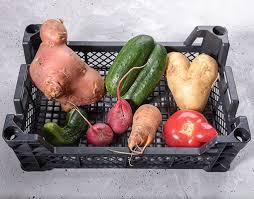
Does it Take more work to grow food that looks Odd?
I asked a question to Papy Michel (our gardening expert from France). He has a garden with imperfect fruit and vegetables. He answered the question. Does it take more time to grow imperfect produce? He said It takes a lot of work in his garden because he has a plum tree, fruit tree, apple tree, pear trees, cherry, figs and prunes and berries. The critters come and help the garden blossom. It takes a lot of work to grow a lot of delicious foods. Why does it take work to grow? Because he doesn't use chemicals to grow his fruits and vegetables.
The protective clothing used when spraying poison.
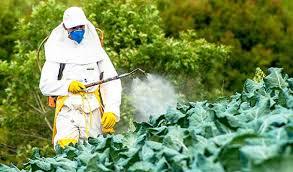
So now you know when you eat a fruit or vegetable that looks perfect and there are a bunch of chemicals that when the people put the chemicals on the crops they are wearing hazmat suits and we are putting this stuff into our mouths.
When we throw away an apple that has a little bruise just think about how much fruit and vegetables are wasted and don’t judge a fruit by it’s appearance.
Bibliography
https://theconversation.com/ugly-veg-supermarketsarent-the-biggest-food-wasters-youare-111398#:~:text=%E2%80%9CUgly%E2%80%9D%20or%20 %E2%80%9Cwonky%E2%80%9D,rates%20of%20any%20fo od%20type.
Food Waste 101 - Learn how Imperfect Produce is helping solve food wastage
https://theconversation.com/ugly-veg-supermarketsarent-the-biggest-food-wasters-youare-111398#:~:text=%E2%80%9CUgly%E2%80%9D%20or%20 %E2%80%9Cwonky%E2%80%9D,rates%20of%20any%20fo od%20type.
Qatar, it is 100% halal.... Or is it? (Oliver 6A)
When students started investigating about harmful farming practices, they also began to question the contents of their food. I never looked at preservatives and colourants in class and I was delighted when students began exploring this on their own. Some students mentioned that additives had health risks and no benefits and students questioned the need for added sugar. None of us realised that even halal labels might be affected by artificial chemicals and additives and Oliver decided to take this issue further...
One day, I was eating some crackers like I normally do, but then I took a second look at the box. I expected to see ingredients like wheat and salt but then I saw weird numbers like E-320, and I was confused. So then I looked at some other boxes, and then some more, and I found out, that 4⁄5 of them, all had those numbers, so then I started to research these numbers, and after going through some articles, I saw one that stood out, and it said, “Be Careful, some E-Numbers aren’t Halal at all!”
I was just sitting there, shocked because as you all know Qatar is an 100% halal country...
Well, maybe we need to think again!
As you can see in the picture above, there is some confusion about which E numbers are safe for Muslims-and I found some of these numbers on foods that I enjoy eating (food that came out of my kitchen!)
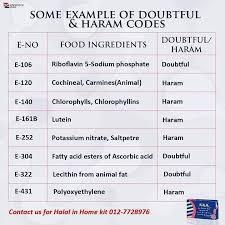
Now, this information I have gathered will most likely be scary to most of the Muslims living in Qatar. 67.7% of Qatar's population are Muslims, and the estimated crackers bought per year is, 20,000 crackers a year, now if we estimate that 13% of those crackers are the crackers that I had been eating, then the amount of those crackers bought and most likely eaten, are 2600. If we have estimated all of this and 67.7% of people are Muslim in Qatar, then that means 2600 of those crackers are bought and eaten every 4 months, now if we multiply that by 3, we will get the 12 months (1 year) amount of crackers bought which will be 7,800 of those crackers eaten per year, and that is only 1 of the many
things with E-numbers. (This is all based on my estimation, and the estimate of 20,000 crackers bought per year.
So why is there so much confusion and how can we stay safe?
Firstly, on December 7, I conducted a survey with grade 6 to see if other young Muslims knew anything about this topic. This is what I discovered:
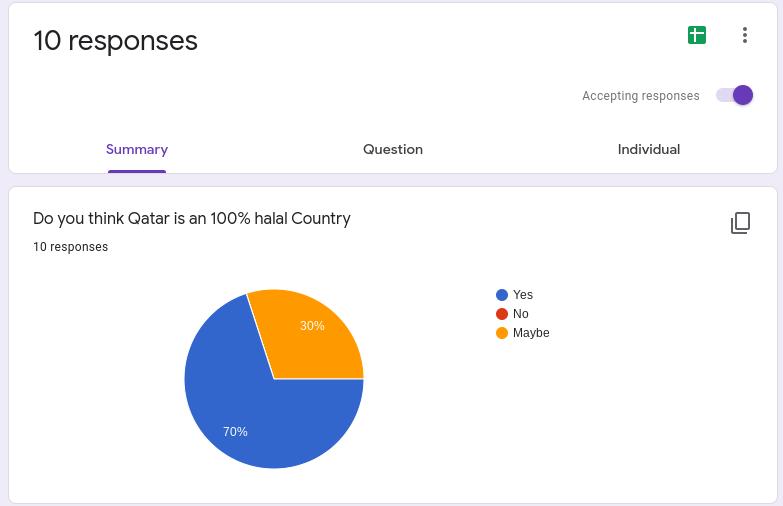
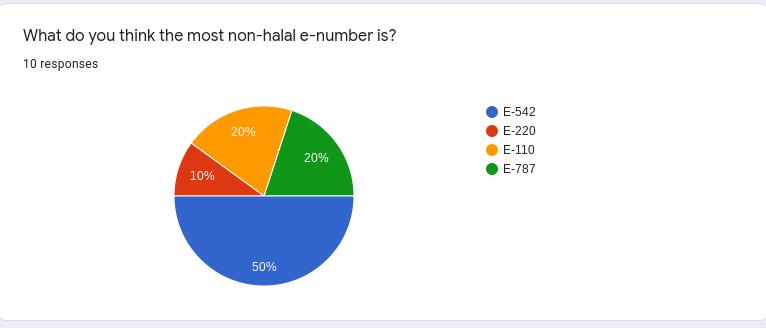
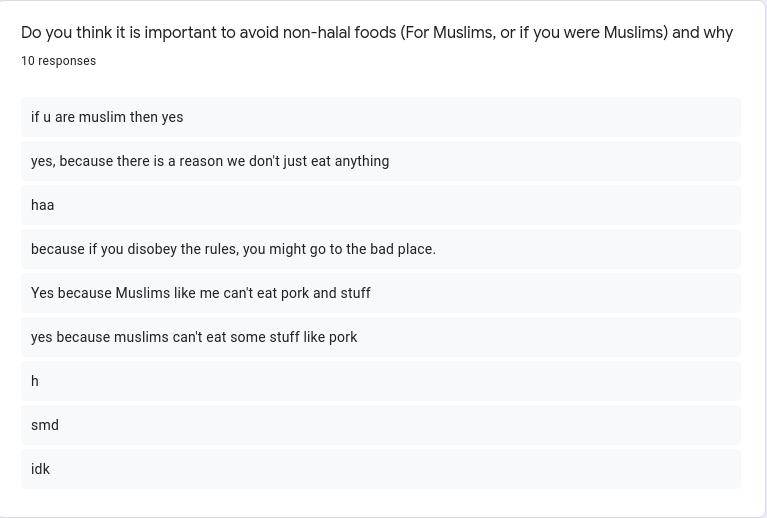
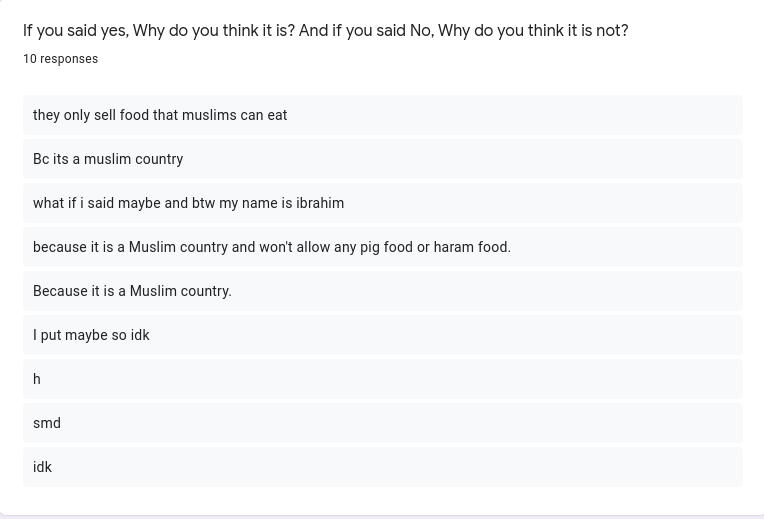
So, with some research and a little bit of asking people, I have come to the conclusion that, there is no way you can look at something off of your mind and say, “that isn’t halal” unless you study all of the e-numbers and what they are mixed with.
As you can see, there is no way you can look at something and say, that is not halal and even strict Muslims could be consuming food items that are not good for them.
The problem is that a lot of the e-numbers are halal on their own but not halal when they are mixed with a type of oil derived from pork or bone, but they are halal when they are mixed with vegetable oil, so it is a confusing thing to get around because this is not on the label. Some e-numbers come from animals that are halal but not slaughtered in a halal manner. Some E numbers are also derived or mixed with alcohol (and again, this is not labeled) but if you research your numbers, you will be able to find out whether or not your food is really halal as there are Muslim websites that check these foods.
I went online to check how serious this is from a Muslim point of view and I found out that, if you accidentally eat something haram, or non halal, it will not count as a sin, but, it says it is just like eating something poisonous accidentally. You will still suffer health consequences but it will not be counted as sin.
Here is a guide on what to look for:
After Oliver shared his concerns with his fellow students, some of the boys mentioned that their parents were now taking them to halal organic markets where they could purchase their favourite snacks without the artificial additives. The boys were proud that their snacks were healthier and holier and better for the environment.

Citations:
http://www.exploreenumbers.co.uk/E-Numbers-NotSuitable-for-a-Halal-Diet.html https://www.quora.com/How-do-I-overcome-guilt-oreating-non-halal-food-accidentally https://en.wikipedia.org/wiki/ Islam_in_Qatar#:~:text=The%20local%20population%2C%20 made%20up,Hindu%2C%20and%203.1%25%20Buddhist. https://www.qatarliving.com/forum/socialising/posts/ non-halal-meat-local-restants carrefour



